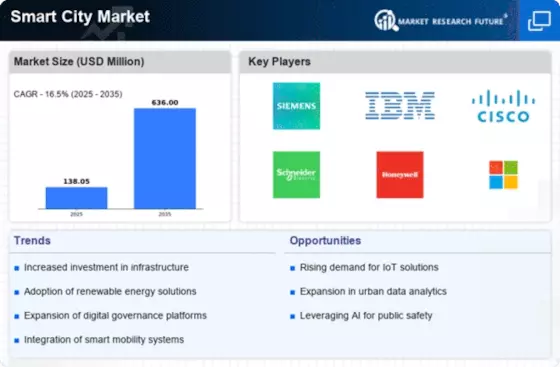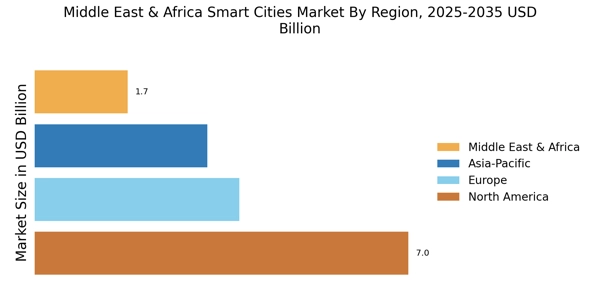Technological Advancements
Technological advancements are significantly influencing the Middle East and Africa Smart Cities Market. The integration of Internet of Things (IoT), artificial intelligence (AI), and big data analytics is transforming urban management and service delivery. For example, smart traffic management systems utilize real-time data to optimize traffic flow, reducing congestion and improving air quality. The market for smart city technologies in the region is expected to reach USD 20 billion by 2025, driven by the increasing adoption of these advanced technologies. Furthermore, the proliferation of mobile applications and digital platforms is enhancing citizen engagement and participation in urban governance. As technology continues to evolve, it is likely to unlock new opportunities for innovation and efficiency in urban environments, thereby propelling the smart cities market forward.
Investment in Infrastructure
Investment in infrastructure is a vital driver of the Middle East and Africa Smart Cities Market. The region is witnessing substantial investments in transportation, energy, and communication infrastructure to support the development of smart cities. For instance, the African Development Bank has committed to financing various infrastructure projects across the continent, aiming to enhance connectivity and promote economic growth. Additionally, the UAE is investing heavily in renewable energy projects, aligning with its vision for sustainable urban development. These investments not only improve the quality of life for residents but also attract foreign direct investment, fostering economic diversification. As infrastructure development continues to advance, it is expected to create a robust foundation for smart city initiatives, facilitating the integration of innovative technologies and services.
Rising Demand for Sustainability
The rising demand for sustainability is increasingly shaping the Middle East and Africa Smart Cities Market. As environmental concerns gain prominence, cities are seeking to implement sustainable practices in urban planning and development. This includes the adoption of green building standards, renewable energy sources, and efficient waste management systems. For example, cities like Cape Town are implementing smart water management solutions to address water scarcity issues. The market for sustainable technologies in smart cities is projected to grow significantly, driven by both regulatory pressures and public demand for eco-friendly solutions. Furthermore, the emphasis on sustainability is likely to foster collaboration between governments, businesses, and communities, creating a holistic approach to urban development. This collective effort may enhance the resilience of cities against climate change and promote long-term sustainability.
Urbanization and Population Growth
The rapid urbanization and population growth in the Middle East and Africa Smart Cities Market is a primary driver of development. As urban areas expand, the demand for efficient infrastructure and services increases. By 2030, it is projected that over 60% of the population in the region will reside in urban areas, necessitating the implementation of smart city solutions. This trend compels governments and private entities to invest in technologies that enhance urban living, such as smart transportation systems, energy-efficient buildings, and integrated public services. The need for sustainable urban environments is becoming increasingly urgent, as cities strive to accommodate growing populations while minimizing environmental impact. Consequently, this urbanization trend is likely to propel investments in smart city initiatives, fostering innovation and collaboration across various sectors.
Government Initiatives and Policies
Government initiatives and policies play a crucial role in shaping the Middle East and Africa Smart Cities Market. Many governments in the region are actively promoting smart city projects as part of their national development strategies. For instance, the UAE has launched the Smart Dubai initiative, aiming to transform the city into the world's smartest and happiest city by 2021. Similarly, Saudi Arabia's Vision 2030 emphasizes the development of smart cities to diversify the economy and enhance the quality of life. These initiatives often include substantial funding and regulatory support, which can stimulate private sector participation. The alignment of government policies with smart city objectives is likely to create a conducive environment for innovation and investment, thereby accelerating the growth of the smart cities market in the region.

















Leave a Comment